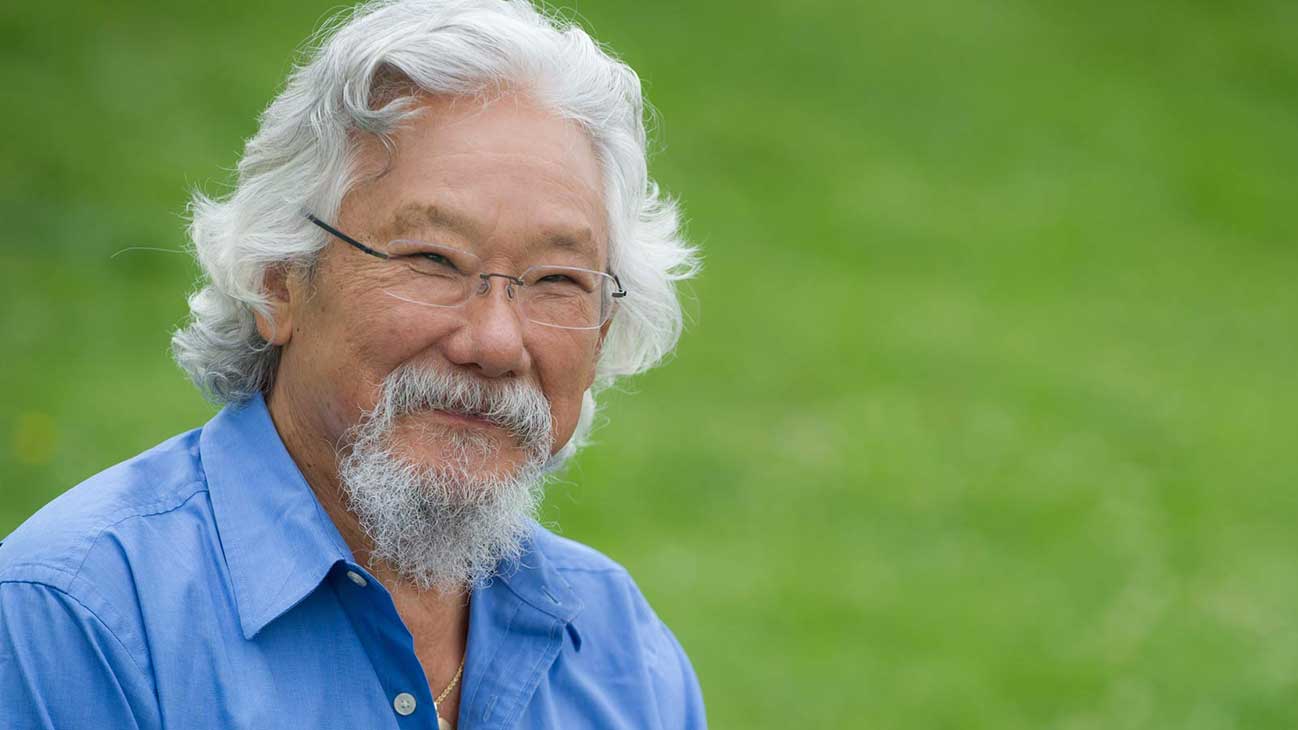David Suzuki says he really isn’t one for birthdays, but he’s making an exception for his 80th.
The life of the noted scientist, activist and broadcaster will be celebrated with a special broadcast of CBC’s The Nature of Things on Thursday at 8 p.m.
Reached by phone in Vancouver, Suzuki traces his cavalier attitude about birthdays to his boyhood, when his family was among the thousands of Japanese Canadians forcibly moved to internment camps following attacks on Pearl Harbor.
“I realized that it all was in the roots of the Second World War when we were shipped out of Vancouver into camps and we had nothing with us,” Suzuki says.
“I kind of grew up without thinking a great deal about birthdays.”
But the 80th is special, he concedes.
“Well, I can’t avoid it, you’ve got to admit,” he says.
“It’s really funny, 50 was no big deal, (same with) 60, 70. But 80, you’ve got to realize, ‘My God, you really are old.’ There’s no getting away from it!”
Suzuki chatted about celebrating milestones, recognizing failures and maintaining hope for the future.
Q: Happy birthday! What will you be doing Thursday?
A: We’re all going to our cabin on an island up here where we don’t have a TV set and we’re going to go to our neighbours’ to watch the show.
Q: I get the sense that family is paramount for you. You can’t help but wonder what the world will be like when your grandchildren are 80.
A: Well, yeah, I’ve just come back yesterday from two weeks in Australia and we snorkelled on the Great Barrier Reef, which I always do when I go to Australia, and it was devastating this time. I first dove on the reef in 1989 and what I see now is a shadow of what it once was. It’s devastating. You talk about looking to the future, it’s very, very depressing. We’ve got to get off our ass, the world is in bad shape.
Q: People often refer to you as alarmist.
A: You’re damn right. I don’t know why this is supposed to be a bad word but, yes, I am an alarmist. I am raising the alarm and saying — especially now as an elder — I remember what the world was like when I was a boy. And yes it’s true, our lives are immeasurably easier to live . . . and we can be very, very impressed with those things but, at the same time, my grandchildren can’t go fishing where I did when I was a boy, and the Barrier Reef is a mess and much of the forest of British Columbia has been invaded and cut down.
Q: You’ve said the environmental movement has failed.
A: A lot of the victories that we thought we celebrated, certainly I did — stopping dams and stopping drilling and stopping supertankers — well, 30, 35 years later, the same problems have returned. We stopped Site C, the dam on the Peace River 35 years ago, we stopped it. But now (B.C. Premier) Christy (Clark) is going ahead and building it. . . . And we stopped supertankers that were going to come down the B.C. coast from Alaska, but now we’re proposing to let supertankers start right off on the B.C. coast with things like pipelines. So what the hell has happened?
Q: It sounds like the target has to shift, then.
A: We have to look at the world in a different way. And this is the real crisis, I think is that we somehow feel that we no longer live as part of nature. Because 85 per cent of Canadians live in big cities. And in a big city you think, “Well, my most important thing is my job, I need a job to earn money to buy my food and live in a house and all that.” And so the economy becomes our highest priority and we forget that if you don’t breath air for three minutes you’re dead.
Q: Now we have a new prime minister.
A: We have a new prime minister, but he’s got 10 years of no action to catch up on, more than 10 years because the previous government talked but didn’t do much. So he’s got a big challenge.
Q: I’m surprised that after all these years you are still not comfortable with celebrity.
A: My family has really pounded me on the head about this. People, because they watch you often in their bedrooms, they feel an intimacy that television gives them that really isn’t there. The person people see on the television screen is not me. And yet people feel that a relationship is established and so it never occurs to them that if I’m with my family or even talking intently with friends or people that they shouldn’t come crashing in.
Q: You have been a target so I can understand why you might be apprehensive about strangers. There’s a section in Thursday’s special in which you talk about the history of your home and the one thing you don’t mention is the time a bullet came through the window.
A: Yeah. And my office at UBC was broken into twice and they got into my computer. I always looked on it as intimidation to say, “We’re around and you ought to shut up.”
Q: What’s been your biggest achievement?
A: My proudest achievement is my children who I feel are very decent Canadians and they’ve worked hard all their lives and they’re all environmentalists. I’m very, very proud of my children. In terms of recognition, I guess to me one of the most delightful and satisfying things was becoming a companion of the Order of Canada. I can’t imagine a higher honour from Canadians than that.

